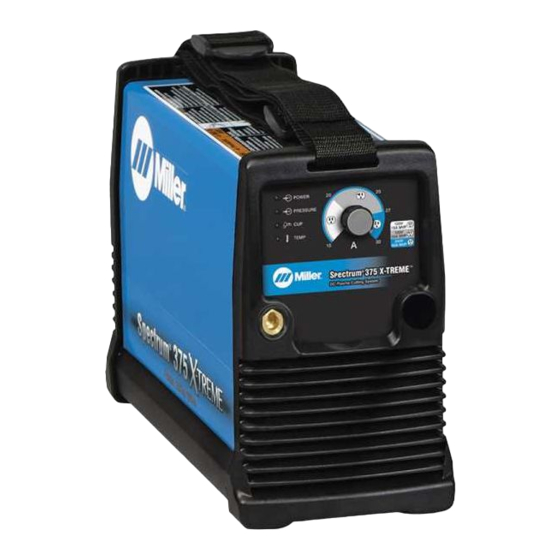Miller XT30 Manuale d'uso - Pagina 32
Sfoglia online o scarica il pdf Manuale d'uso per Sistema di saldatura Miller XT30. Miller XT30 40. Air plasma cutting and gouging
Anche per Miller XT30: Manuale d'uso (44 pagine)

7-7. Status/Trouble Lights
.
Difficulty establishing a pilot arc may indicate consumables need to be cleaned or replaced.
Light
Power
On
Off
Pressure/Cup/T emp
Flashing rate is steady for 15 seconds or until torch trigger
Power
is pressed again, whichever comes first.
Repetitive flashing rate of two quick cycles, then a one
Power
second pause.
Pressure
On
Flashing rate is steady for 15 seconds or until torch trigger
Pressure
is pressed again, whichever comes first.
Repetitive flashing rate of two quick cycles, then a one
Pressure
second pause for a 15 second period.
On
Cup
Flashing rate is steady for 15 seconds or until torch trigger
Cup
is pressed again, whichever comes first.
Repetitive flashing rate of two quick cycles, then a one
Cup
second pause for a 15 second period or until torch trigger
is pressed again, whichever comes first.
Repetitive flashing rate of three quick cycles, then a one
Cup
second pause for a 15 second period or until torch trigger
is pressed again, whichever comes first.
On
Temperature
On (indefinitely)
Temperature
Flashing rate is steady (indefinitely).
Temperature
For system troubleshooting see Section 7-8 and Section 7-9.
OM-253 555 Page 28
.
A complete Parts List is available at www.MillerWelds.com
Condition
Status/Possible Cause
Input power is okay.
When Power light is on, system is normal if these lights
are off.
Input power below 88 volts AC, but has returned to
normal.
Input power is below 88 volts AC.
No or low [below 40 psi (276 kPa)] input pressure.
Regulated pressure in the unit is low. Check torch for
leaks. Check input pressure to unit is between 90 to 120
psi (621 to 827 kPa).
Regulated pressure in the unit is high. Check input pressure
to unit is between 90 to 120 psi (621 to 827 kPa).
Torch cup is loose or off. Once cup is tightened, unit
power must be cycled off and back on again.
No arc was established. Check consumables or torch.
No pilot arc established possibly due to a loss of current.
Check consumables.
Consumables in torch failed to separate during pilot arc
possibly due to being stuck. Check consumables.
Power source overheated (see Section 4-4). Stop cutting
and allow unit to cool down.
Power source temperature sensors may have failed or
ambient temperature is below -22 F (-30 C).
Power source temperature sensor provided inaccurate
readings, but returned to normal. Unit power must be
cycled off and back on again.
Stalled or locked fan. Clean or replace as needed.
